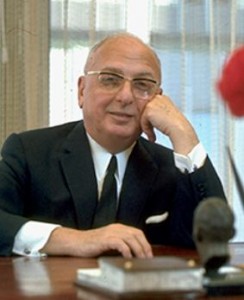
Diane von Fürstenberg (Credit: Ed Kavishe)
Diane Simone Michelle Halfin (b. 1946) was born in Belgium, the daughter of a Moldavian-Jewish immigrant father and a Greek-Jewish mother who survived the Holocaust. She was born just 18 months after her mother was liberated from Auschwitz. Halfin studied economics at Madrid University and the University of Geneva. During this time, she met Prince Egon of the German aristocratic house of Fürstenberg. The couple soon married and had two children: Prince Alexander and Princess Tatiana. The now-Princess Diane did not want to be a trophy wife, and “decided to have a career. I wanted to be someone of my own, and not just a plain little girl who got married beyond her desserts.” She followed her passion into fashion design and apprenticed at a textile factory in Italy. It was here that she first came up with her idea of the “jersey dress”. Unfortunately, the Prince and Princess separated (a major reason being the disapproval of the Prince’s family of a Jewish bride), and Diane became a full-time fashion designer in New York. She started her business with a $30,000 loan from her father. In 1974, she finally introduced her jersey “wrap dress”. It took the world by storm, and over 5 million dresses were sold in just one year. Von Fürstenberg expanded into cosmetics and fragrances, and was soon among New York’s most successful fashion designers and businesspeople. After moving to Paris in 1985 to open a publishing house and a European cosmetics line, she returned to New York in 1997 to re-launch her American business. The jersey dress returned to immense popularity. In 2004, von Fürstenberg launched new collections of jewellery and beachwear. A couple of years later, she was made President of the Council of Fashion Designers of America, a position she still holds. She is one of the most popular designers among celebrities, and her dresses have been worn by the likes of Kate Middleton, Michelle Obama, Madonna, and Jennifer Lopez. Von Fürstenberg is also a noted philanthropist (together with her current husband Barry Diller), having donated millions to a wide array of causes including public housing, education, human rights, health, and the environment. Every year, she presents a $50,000 “DVF Award” at the United Nations building to each of five women “who display leadership, strength, and courage”. She is on the board of Vital Voices, an organization that assists women around the world, particularly in the area of economic empowerment. In 2014, she gave $12 million to help restore the crumbling historic Jewish ghetto of Venice (the oldest in the world). Von Fürstenberg also had her own reality TV show (House of DVF) that ran for two seasons, and has written two popular books. She still presides over 111 DVF stores around the world. She was recently ranked by Forbes among the world’s most powerful women, and in the TIME 100 list of iconic figures.
Words of the Week
One feels the beauty of the world only according to the measure of beauty that is in the inner core of one’s soul.
– Rabbi Abraham Isaac Kook



